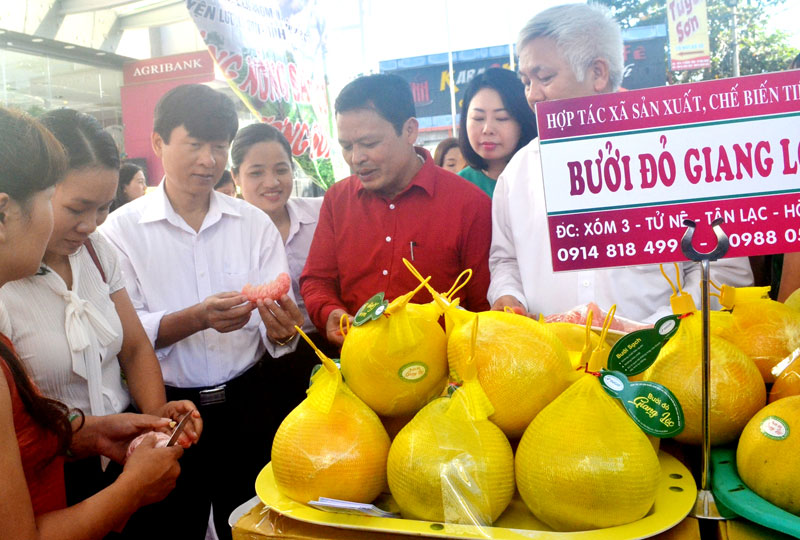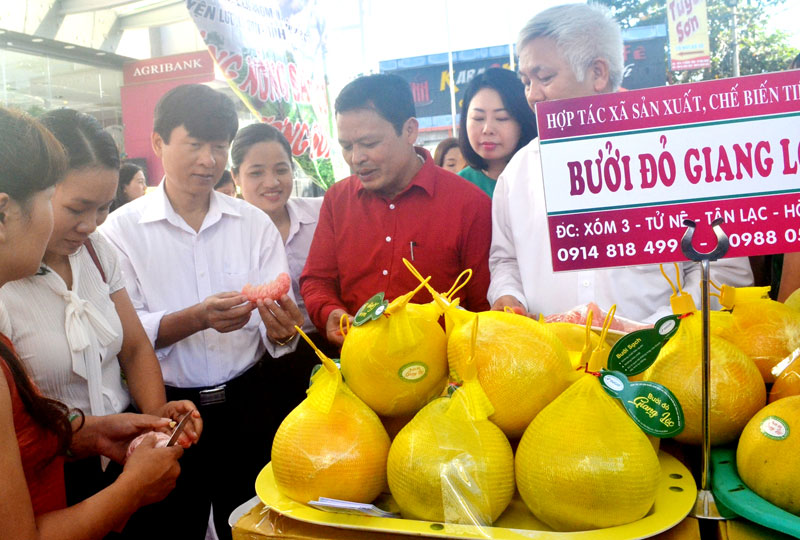
(HBO) – The cultivation of Tan Lac red-flesh grapefruit, a collective trademark successfully registered in November 2017, in accordance with VietGAP standards is now a plus in the quality of the specialty of Hoa Binh province.

The cooperative for Tan Lac red-flesh grapefruit production,
processing and consumption introduces their VietGAP-certified products and
receives positive feedback from consumers.
In the first crop (2017-2018) when its products
were put on the market, the cooperative for Tan Lac red-flesh grapefruit
production, procession and consumption (Tu Ne commune, Tan Lac district)
impressed consumers with their grapefruits that not only have attractive look
and good quality but also are recognised with the VietGAP label, which help win
the trust of the most choosy consumers.
The cooperative currently has about 30ha of
fruit trees, mainly red-flesh grapefruit trees. About 7ha of the area was
harvested in the 2017-2018 crop. VietGAP standards were applied in all of this
farming area.
The cooperative has also equipped itself with a
grapefruit cleaning, classifying, packaging and preserving system so as to
supply products with the best look and quality and the collective mark of "Buoi
do Tan Lac” (Tan Lac red-flesh grapefruit) that satisfy VietGAP standards.
VietGAP standards were adopted in the farming of
the Tan Lac specialty in tandem with the formation of farming household groups,
registration of the trademark and bar codes, and designing of packaging and labels.
After receiving the VietGAP certification,
specialised agencies of Tan Lac district and farmers who practice VietGAP
standards will coordinate with the consultation partner to complete registering
the trademark and bar codes and printing labels. This will ensure that products
with VietGAP certificates will have all necessary information to be
recognisable in the market, which is also a factor helping to bring products to
consumers in a transparent manner. This is considered a "golden key” for local
farm produce to access major markets and capitalise on opportunities to further
develop.
Vu Quang Hung, head of the agriculture and rural
development division of Tan Lac district, said about 45ha of the nearly 1,000ha
of grapefruit trees in Tan Lac is being cultivated in line with VietGAP
standards. The district plans to continue expanding this area, with the goal of
having about 200ha following VietGAP and other food safety standards./.
According to data from the Hoa Binh Provincial Party Committee, the industrial production index for the first six months of 2025 is estimated to have increased by 20% compared to the same period last year. This marks the highest year-on-year growth rate for this period since 2020.
In the first six months of 2025, Hoa Binh province’s export turnover was estimated at 1.145 billion USD, marking an 18.11% increase compared to the same period in 2024. Import turnover was estimated at $ 804 million, a 17.15% increase, which helped the province maintain a positive trade balance.
The lives of the ethnic minority farmers in Tan Lac district have gradually improved thanks to the new directions in agricultural production. This is a testament to the collective strength fostered through the professional associations and groups implemented by various levels of the district’s Farmers’ Union.
With the motto the "product quality comes first,” after nearly one year of establishment and operation, Muong village’s Clean Food Agricultural and Commercial Cooperative, located in Cau Hamlet, Hung Son Commune (Kim Boi district), has launched reputable, high-quality agricultural products to the market that are well-received by consumers. The products such as Muong village’s pork sausage, salt-cured chicken, and salt-cured pork hocks have gradually carved out a place in the market and they are on the path to obtaining the OCOP certification.
In the past, the phrase "bumper harvest, rock-bottom prices" was a familiar refrain for Vietnamese farmers engaged in fragmented, small-scale agriculture. But today, a new spirit is emerging across rural areas of Hoa Binh province - one of collaboration, organisation, and collective economic models that provide a stable foundation for production.
Maintaining growing area codes and packing facility codes in accordance with regulations is a mandatory requirement for agricultural products to be eligible for export. Recently, the Department of Agriculture and Environment of Hoa Binh province has intensified technical supervision of designated farming areas and packing facilities to safeguard the "green passport" that enables its products to access international markets.



